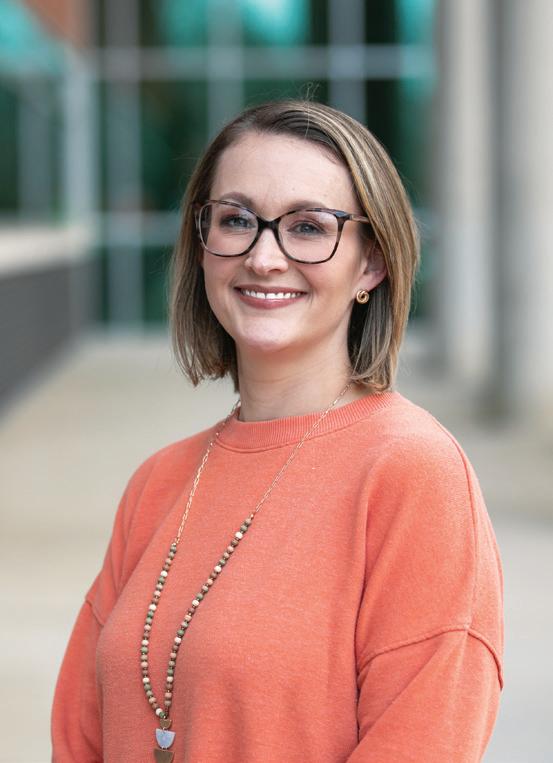
4 minute read
FACULTY AWARDS
Dr. Ashton Davis 2022 Young Faculty Teaching Award
Lander Lecturer of Chemistry Dr. Ashton Davis, the winner of this year’s Young Faculty Teaching Award, specializes in making general education chemistry courses more accessible for students.
Before beginning work at Lander in 2020, she was a chemistry learning specialist at the University of North Carolina at Chapel Hill, a role in which she served as both an academic coach and leader of CHEMpossible, a learning group for students in introductory chemistry courses.
She has continued teaching general education chemistry courses since arriving at Lander. In 2021, she became coordinator of the Chemistry 105/106 sequence, a position that involves working with instructors to standardize curriculum and policies among different sections. Davis developed course-specific materials for the Chemistry 105 lab, including a recitation assignment, a recitation activity PowerPoint for instructors, quizzes and grading rubrics.
“Recitation takes place during the first 45 minutes of lab and includes a few select problems from the previous week’s content. The instructor can go over the problems at a slower pace and answer questions from students,” she said.
Students need all the help they can get, according to Davis, who earned a Ph.D. in organic chemistry at the University of Florida.
“Most students taking CHEM 105 are first-semester freshmen, and the transition from high school classes to college classes is a big one,” she said. She helps students by giving them “low-stakes opportunities to test their knowledge. We have frequent quizzes and clicker-type questions so students can see what they know and what they don’t. The exam is not the time for students to realize they didn’t actually know the information.”
She devotes class time to “working problems together, developing those critical thinking skills, and shifting from passive memorization. It is important that students learn how to think instead of what to think.”
Davis said she has enjoyed her time at Lander.
“The small classroom size allows me to interact with all the students and learn their names, and lends itself to more group activities. I appreciate the support given by my dean and chair to try new things in the classroom and coordinate the CHEM 105/106 lecture and lab courses,” she said. By Jeff Lagrone
The Learning, Involvement, Networking and Knowledge (LINK) program at Lander aims to help provide firstyear University students with a smooth transition into college life. LINK instructors play a vital role in new students’ development,
After graduating from Lander, she was hired as a full-time tutoring and supplemental instruction coordinator in the Academic Success Center (ASC), where part of her role involves providing classroom instruction for the University’s LINK program. Prior


Dr. Zach Rubin 2022 Young Faculty Scholar Award
His research on “intentional communities” has earned Dr. Zach Rubin the Lander University 2022 Young Faculty Scholar Award.
Rubin, an assistant professor of sociology, also led an in-depth study on food insecurity at Lander University, the first such study to document the challenges faced by students not having consistent access to food and/or meals.

His research on intentional communities, also known as communes, received national recognition from the Communal Studies Association, which selected Rubin for the “Outstanding Article” award in this field of research in 2020 and again in 2021 – the first time a researcher has received the honor in two consecutive years. In addition to five journal articles, Rubin also has written two book reviews, contributed three pieces to the American Sociological Association’s national teaching resource and made five conference presentations.
Intentional communities have existed in America since the early 1600s. In fact, some researchers consider Jamestown, the first permanent English settlement in the Americas, and the Massachusetts Bay Colony, settled by the Puritans, to be early examples of intentional communities.
Dr. Lucas McMillan, dean of Lander’s College of Behavioral and Social Sciences, said Rubin’s research actively informs and improves his teaching.
“He has re-shaped courses to give students practice in gathering data about the Greenwood area and then helps students use community-oriented data to understand social problems. His work on food insecurity led students to participate in a ninecounty phone survey,” he said. “Dr. Rubin has connected and collaborated with local nonprofits on these data projects and to better demonstrate the applied nature of sociology.”
Rubin earned his bachelor’s degree in geography and sociology from the University of Missouri, Columbia, as well as a master’s degree in geography and doctorate in sociology. Before joining Lander’s faculty in 2019, Rubin was a graduate instructor at the University of Missouri and an adjunct professor in the Department of Sociology at the University of Indianapolis.

He is an associate editor of the Criminology and Deviance Section of TRAILS, the Teaching Resources and Innovations Library in Sociology. For the Communal Studies Association, Rubin is a member of the board of directors and also is chair of the Book Awards Committee. He is on the board of the Center for Sustainable and Cooperative Living at Dancing Rabbit Ecovillage.
Rubin, who has received travel and research grants to support his studies, is chair of Lander’s Student Needs Committee and a faculty mentor of the Tabletop Gaming Association. He has been a volunteer at Lander’s Bear Necessities Food Pantry since its opening in 2020. By
Karen Petit
to her graduation, Pilgrim was a student employee of the ASC and was recognized as the ASC Mentor of the Year in 2021. “When students come into the Academic Success Center and have questions, she’s always the first to say ‘let me help you,’ or ‘I’ll show you how to do that,’” said Anissa Lawrence, academic transfer coordinator.
In her role as LINK instructor, Pilgrim fosters the growth of new Bearcats’ intellectual skills and interpersonal competencies for collegiate success. Additionally, she also helps students get comfortably settled into college life, while encouraging each individual student to explore their sets of personal values, and fosters commitments to exploring and pursuing their life goals. By
Zack Bennett










